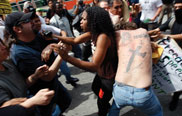 Getty Images
Getty Images
Article
The endless cycle of meltdowns, outbursts and violence is growing worse. What is behind the rage?
Learn the why behind the headlines.
Subscribe to the Real Truth for FREE news and analysis.
Subscribe NowIn the San Francisco Bay Area, a 51-year-old father of eight works two jobs to care for his family. Due to an irregular work schedule, and a stressful commute from his Antioch home, he sleeps in his car between shifts, home only on weekends. The pressures of being away from his family, marital troubles, and working two jobs to make ends meet leads to an emotional meltdown. Driving his SUV across the Bay Bridge, he calls 911 on his cellphone and threatens to commit suicide with a pipe bomb—a threat that shuts down traffic and holds the bridge hostage for hours.
Across the water in East Oakland, two groups of costumed women on Halloween night hurl insults at each other, followed by chairs and dishes, trashing a Denny’s restaurant in the process.
Elsewhere, a jealousy-enraged Florida mother of three burns her husband’s boat, go-kart and Jacuzzi over an argument about a popular actress. The wife also punches her husband and threatens to put his dog “to sleep.”
In New Hampshire, a 17-year-old girl seeks to get even with her mother for an unresolved argument they had two days earlier. She poisons her mother’s drink with a household disinfectant.
A 52-year-old Delaware man ends his online relationship with a 33-year-old North Carolina woman he met in “Second Life,” a popular Internet-based virtual reality game. Distraught, the woman drives to the man’s workplace in Pennsylvania and attempts to kidnap him at gunpoint. Having failed, she breaks into his home two weeks later, bringing with her handcuffs, duct tape, a Taser and a BB gun.
On I-95 in Virginia, a Toyota cuts off a Lexus, whose driver reacts by tailgating. The Toyota’s driver responds by tapping his brakes. The driver of the Lexus pulls up and throws a small container of yogurt at the Toyota, the driver of which flashes a small handgun. Each calls law enforcement authorities on his cellphone and reports the other. A state trooper arrests both drivers.
Welcome to the age of rage, in which seemingly normal, everyday people emotionally “flip out,” “go wild” and do the unthinkable, only to quickly regret their words and actions—sometimes after a life has been taken.
What is behind such rash behavior and thirst for quick revenge?
 Evert Elzinga/AFP/Getty Images
Evert Elzinga/AFP/Getty Images
Seeking a Solution
Human behavior experts struggle to offer concise explanations for today’s rage. Some define the problem as IED: “intermittent explosive disorder.”
According to Psychology Today, IED may result from losing one’s job, being suspended from school, “divorce, difficulties with interpersonal relationships or other impairment in social or occupational areas, accidents (such as in vehicles), hospitalization because of injuries from fights or accidents, financial problems, incarcerations or other legal problems.”
In other words, some people are unable to cope with the stresses, pressures, trials and setbacks of everyday life, which in turn triggers the kind of sudden outbursts and violent actions associated with IED.
What was once recognized as a lack of emotional maturity is now considered a disorder—a medical problem.
Scientists assert that one’s biological makeup, possibly a genetic disposition, as well as being reared in an environment in which explosive behavior and physical abuse were common, contribute to IED. Psychologists originally concluded the disorder was rare, but now believe it could be more widespread.
Relying on scientific reasoning, authorities offer sometimes unrealistic advice: Don’t drive when upset, tired or angry. Avoid all conflict, if possible. Recognize and control your anger, and pay attention to your emotional level.
Experts recommend drugs to help control IED, such as antidepressants, anticonvulsants, anti-anxiety agents and mood regulators. But this means dealing with the often hazardous side effects, including dependency.
People wracked by emotional troubles often try self-help books, 12-step support groups, or psychiatry. They find solace knowing that others are going through what they are, attempt to embrace the power of positive thinking, or try to sort out their feelings by verbalizing them.
Others turn to religion, seeking the advice of ministers. While counsel from these religious leaders often comes in the form of Bible passages intended to be inspirational, in the end, they also largely tell churchgoers to seek medical advice to solve their problems.
What most miss when they pick up the Bible is that it thoroughly explores the human condition, and provides instruction and real answers. It offers in-depth insight into why people think, communicate and behave the way they do—and why they increasingly commit bizarre actions in the heat of the moment.
Most assume the Bible’s text is antiquated and unable to offer relevant solutions to the high-pressure, never-ending, 21st-century rat race. Yet the insightful wisdom contained in this undervalued, much-neglected and widely misinterpreted book is of supreme value.
Foretold Long Ago
Knowing the character of society would worsen with each passing generation, God foretold in the book of II Timothy what conditions would be like in the last days—what could also be called the age of rage: “This know also, that in the last days perilous times shall come. For men shall be lovers of their own selves, covetous, boasters, proud, blasphemers, disobedient to parents, unthankful, unholy, without natural affection, trucebreakers, false accusers, incontinent, fierce, despisers of those that are good, traitors, heady, highminded, lovers of pleasures more than lovers of God; having a form of godliness, but denying the power thereof” (3:1-5).
A close examination of these verses reveals that perilous times are here now!
•Perilous: The above passage was originally recorded in ancient Greek. To describe today’s “perilous times,” the word chalepos was used, which means “troublesome, dangerous, harsh, fierce, savage.”
How true of modern society!
Examples of savage acts of rage regularly make news headlines. In Cleveland, Ohio, a 25-year-old college student argued with a 27-year-old parking lot attendant, who charged double the posted $10 price for parking. The heated argument turned violent, with the attendant holding the other in a headlock, then letting go and telling him to leave. Embarrassed for being humiliated in front of his date, the student opened his car trunk, grabbed his .40-caliber pistol and shot the attendant three times—twice in the stomach and once behind his ear as he lay on the ground bleeding. Found guilty of murder, the college student was sentenced to 18 years in prison before he is eligible for parole.
•Lovers of their own selves: In other words, selfishness to the extreme. The “Me Generation,” in which each person always demands his own way—no matter the cost. The 21st-century is an age of “Me-isms”—me first, what about me—perhaps best summed up by the 1969-70 pop song “I, Me, Mine.”
This is the attitude behind an online feud between childhood friends that may have ended with the world’s first Twitter murder. According to prosecutors, the two men, who lived on the same floor of a high-rise apartment building in Harlem, New York, exchanged angry comments through microblog postings—tweets—arguing over a girl. One man died after being shot in the neck as he left his home. The murder weapon, along with a spent shell, was found in Central Park.
•Incontinent: The original Greek word means “without self-control, intemperate” and describes an age in which people “fly off the handle” and give themselves to emotional meltdowns they soon regret. In turn, they feel they have to get even by any means necessary.
Consider the example of the 16-year-old Iowa girl who burned down her family’s home, killing two dogs and a cat, because she disagreed with her mother’s punishment of taking away her cellphone and Internet privileges. The teen could receive a 25-year prison sentence if found guilty.
•Fierce: The meaning of this is “savage, untamed, wild.” Certainly this describes those who suddenly “go wild,” as when an intoxicated 60-year-old West Virginia man became upset with his wife because she did not have dinner ready. After throwing furniture, and breaking glass in cabinets, he burned down his home.
•Heady: “Rash, reckless, headstrong”—the Greek literally means “to fall forward.” Society is full of those who are quick to “fall forward”—to act first and think of consequences later (if at all). These reckless acts can happen anywhere, and over the tiniest inconveniences.
For example, when a clerk would not sell him beer, a 22-year-old man in California rammed his car into a gas pump, exploding all eight pump machines and destroying the gas station attached to the convenience store.
•Highminded: The Greek word used here is typhoo, related to typhoon, and it can be defined, “To be puffed up with haughtiness or pride; to blind with pride or conceit, to render foolish or stupid.” Such people, in effect, come off as disastrous storms, which endanger the peace, security and lives of others.
Responding to a party announced on Twitter by a 15-year-old girl, a mob of 150 drunken teenagers trashed her grandparents’ home, ripping off the patio doors, destroying paintings, smashing televisions and windows, stealing bottles of champagne and ornaments, and leaving empty beer bottles strewn across the lawn. Incredible!
Now let’s examine what has led to such perilous acts in this age of rage that the Bible defines as the “last days.”
Grand Architect
Man, in his folly, believes that he can discover all he needs to know through his five senses. He uses the scientific method to explain the world around him. If it cannot be detected through sight, sound, taste, smell or touch, then it cannot exist, the thinking goes.
 Peter Macdiarmid/Getty Images
Peter Macdiarmid/Getty Images
This thinking drove the course of civilization. While there have always been advancements in technology, medicine and engineering—leading to the stunning achievements of today—man has never been able to solve his worst problems: disease, crime, poverty, starvation, violence, perversity and war. What is behind this paradox of incredible advancement and tremendous failure?
Again, the answer is found in the pages of the Bible: “Wherein in time past you walked according to the course of this world, according to the prince of the power of the air, the spirit that now works in the children of disobedience…” (Eph. 2:2).
What man has missed is that these problems are spiritual—meaning they cannot be solved through physical solutions—and are caused by the “prince of the power of the air.”
This being—Satan—is man’s source of carnal lusts and desires. The Bible describes him as the “god of this world” (II Cor. 4:4). Like a powerful satellite orbiting Earth and transmitting signals to radios, televisions and cellphones around the globe, this being broadcasts attitudes, thoughts, ideas and sensuous urgings that appeal to the flesh.
His name literally means “adversary,” and he is the master deceiver, who “deceives the whole world” (Rev. 12:9). He is also called Apollyon, which means “destroyer.”
Satan is the grand architect of this age of rage, who maintains his existence as the unsuspected god of this world.
How effective is he at his craft? Of the world’s nearly 7 billion people, vast numbers do not even believe he exists, while others think he is behind every little thing that goes wrong, such as when a mop mysteriously falls in a closet. Both views are wrong and play right into the devil’s hands. He wants people to ridicule his existence, or reduce him to the laughable image of a man with horns, a pitchfork and a red suit.
Satan was once Lucifer, which means “light-bearer, shining one and morning star.” Scripture reveals that Lucifer was the most perfect being God could ever instantaneously create. From the moment God brought him into existence, Lucifer had it all: wisdom, beauty, talent, and riches, along with power and top position at the headquarters of God’s government (Ezek. 28:12-14). God declared that this great archangel was “perfect” from the very day he was created (vs. 15).
That is, until “iniquity was found” in him (same verse). What is meant by “iniquity,” which in Hebrew means unrighteousness, wickedness or violent deeds of injustice? The answer is found in verse 17: “Your heart was lifted up because of your beauty, you have corrupted your wisdom by reason of your brightness.” In other words, Lucifer was lifted up with pride and vanity.
This powerful archangel was handed everything on a silver platter, and did not earn anything by his own efforts. In his twisted thinking, he deceived himself into believing that he deserved his talents, abilities and position. Rather than fearing—reverencing—his Creator who had empowered him, Lucifer was swayed by pride and thought he deserved all his gifts—and much more.
Lucifer lusted for additional power, a higher position. He became jealous of God, and even conspired to replace Him (Isa. 14:13-14).
The archangel who already had everything was greedy for more. He duped one-third of God’s angels—millions and millions—into believing that he was right and their Creator was wrong. They followed his lead and attempted a cosmic coup d’etat. It failed miserably.
Lucifer became Satan, and the rebellious angels became demons—all enemies of God.
For the past 6,000 years, Satan and his demons have affected the course of human history, with the former Lucifer broadcasting the four major traits of his nature into the carnal mind: vanity, jealousy, lust and greed. These four contribute to creating and enabling today’s age of rage. (You can learn much more on this subject by reading our booklets Who Is the Devil? and A World in Captivity.)
Yet there is still another contributor to these perilous times, which the author of the age of rage uses quite effectively.
False Religion
Thousands of differing and competing denominations and movements, professing to follow Christ, litter the religious landscape—and all claim to be His Church. Close examination of their beliefs and traditions, when compared to the Bible, can easily prove that these churches collectively represent false Christianity. And it is false Christianity that contributes to creating and enabling the age of rage by not teaching the truth about the missing component man needs to make him spiritually complete: the Holy Spirit.
When a human being receives this Spirit, his mind is spiritually begotten with the mind of God. It enables him to comprehend spiritual concepts that even the most learned of minds cannot grasp: “For what man knows the things of a man, save the spirit of man which is in him? Even so the things of God knows no man, but [by] the Spirit of God” (I Cor. 2:11).
How different are humanity’s ways and thoughts from the Creator’s? “For as the heavens are higher than the earth, so are My [God’s] ways higher than your ways, and My thoughts than your thoughts” (Isa. 55:9).
With the Holy Spirit, man can defeat the carnal broadcasts of “the prince of the power of the air,” the pulls of the flesh and the influential sways of this world. In doing so, the spirit-begotten Christian builds holy, righteous, godly character—which is necessary to receive eternal life.
Character is the ability to know right from wrong, to reject the wrong despite pressure to bend and compromise, and deliberately choose the right. It takes a lifetime of overcoming trials, tests and setbacks to build character.
False Christianity teaches none of this—and that is the way Satan wants it.
While this world’s “experts” of human behavior offer “common sense” advice to dealing with the age of rage, the Bible—God’s instruction manual to mankind—offers thorough spiritual instruction.
Psychiatrists and behavioral scientists recommend that people should recognize and control their anger, and that drivers should pay attention to their emotional levels. But the Bible instructs people to go further, and thoroughly and routinely examine themselves. “Study to show yourself approved unto God, a workman that needs not to be ashamed, rightly dividing the word of truth” (II Tim. 2:15). God’s Word, the Bible, is truth (John 17:17); it expresses and reveals the mind of God, which no man can discover on his own.
Those who strive to live God’s Way must compare themselves to God and see how and in what areas they fall short, and work to improve. With the Holy Spirit working through them, human beings can produce the fruits of love (genuine, outgoing concern for others), peace, longsuffering and self-control (Gal. 5:22-23).
Romans 12 presents wisdom that surpasses any advice this world’s experts could offer: “Be kindly affectioned one to another with brotherly love; in honor preferring one another…Bless them which persecute you: bless, and curse not…Recompense [repay] to no man evil for evil…avenge not yourselves, but rather give place unto wrath: for it is written, Vengeance is Mine; I will repay, says the Lord. Therefore, if your enemy hunger, feed him; if he thirst, give him drink: for in so doing you shall heap coals of fire on his head. Be not overcome of evil, but overcome evil with good” (vs. 10, 14, 17, 19-21).
With the Spirit of God working in and through them, converted human beings can conquer carnal nature and employ these verses.
Whenever the stresses of life start to build, people should examine themselves for pride, jealousy, greed and lust—characteristics of human nature that lead people to emotionally melt down and commit vile acts. They should remember “the carnal mind is enmity [naturally hostile] against God: for it is not subject to the law of God, neither indeed can be” (Rom. 8:7), which can often lead it to succumb to vanity, jealousy, lust and greed—and cause people to bend to the pressures of the age of rage.
You now know why the age of rage exists. The perilous times foretold in the Bible’s pages are already here, and will continue to worsen. But those who yield themselves to the true God will survive—and thrive!



